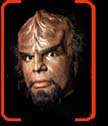 |
 |
 Despite a name that still exudes 1960s sci-fi silliness, the Klingons have
spawned what many of Star Trek's more hard-core fans consider should be
the new international language of choice.
Despite a name that still exudes 1960s sci-fi silliness, the Klingons have
spawned what many of Star Trek's more hard-core fans consider should be
the new international language of choice.
In the original series, in the days before
Klingons had ridges on their brows and the Enterprise's universal
translator never malfunctioned, they spoke perfect English. But for
their return in 1979's 'Star Trek: the Motion Picture', subtitles
were employed for the first time.
This
basic Klingon language was made up of a few random words invented by
James Doohan (Scotty), an actor with a keen interest in linguistics and
accents, if not a natural gift for them. Klingon was immediately
distinguished by its extremely curt - 'Chrkt!' - and guttural phrasing,
single words apparently translating as relatively long, complex
sentences.
But it was not until Paramount saw the story outline for 'Star Trek III:
The Search for Spock' five years later that Klingon as a language was
truly legitimised. The film featured Christopher Lloyd in a frenetic
performance as the Klingon Commander Kruge, and much aggressive banter
between Lloyd's character and his taciturn crew. Paramount hired
linguist and Star Trek fan Marc Orkrand to create an entire Klingon
vocabulary for the exchanges, a labour of love now on sale as 'The
Klingon Dictionary'.
The introduction of Lieutenant Worf as a regular character in The
Next Generation led to a dramatic deepening of the Klingon's cultural
back-story and with it the expansion of the Klingon dialect.
'The Klingon Dictionary', which has sold a
quarter of a million copies to date, has now been joined by
'Conversational Klingon' and 'Power Klingon'. There is also an
ongoing attempt among one fan faction to produce a version of the
Bible in Klingon, so far unsuccessfully. It is rumoured the world's
fluent speakers of Klingon remain in a small minority, although
converts have been known to claim that 'Klingon is the new
Esperanto.'
|
 |
 |
